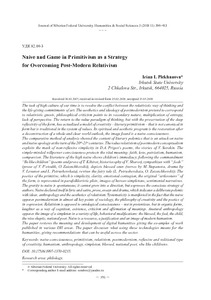Naive and Game in Primitivism as a Strategy for Overcoming Post-Modern Relativism
Скачать файл:
URI (для ссылок/цитирований):
https://elib.sfu-kras.ru/handle/2311/70749Автор:
Plekhanova, Irina I.
Плеханова, И.И.
Дата:
2018-03Журнал:
Журнал Сибирского федерального университета. Гуманитарные науки. Journal of Siberian Federal University. Humanities & Social Sciences;2018 11 (3)Аннотация:
The task of high culture of our time is to resolve the conflict between the relativistic way of thinking and the life-giving commitments of art. The aesthetics and ideology of postmodernism pretend to correspond to relativistic gnosis, philosophical criticism points to its secondary nature, multiplication of entropy, lack of perspective. The return to the value paradigm of thinking, but with the preservation of the deep reflexivity of the form, has actualized a model of creativity – literary primitivism – that is not canonical in form but is traditional in the system of values. Its spiritual and aesthetic program is the restoration after a deconstruction of a whole and clear world outlook, the image found is a naive consciousness.
The comparative method of analysis showed the content of literary polemics that is an attack on naive and naive apology at the turn of the 20th-21st centuries. The value relativism of postmodern conceptualism exploits the mask of non-reflexive simplicity in D.A. Prigov’s poems, the stories of V. Sorokin. The simple-minded willpower consciousness protects the vital meaning: faith, love, patriotism, humanism, compassion. The literature of the high naive shows children’s immediacy, following the commandment “Be like children” (poems and prose of T. Kibirov, historiosophy of V. Sharov), sympathizes with “fools” (prose of V. P’etsukh, O. Zaionchkovskii), depicts blessed ones (verses by M. Stepanova, drama by V. Levanov and L. Petrushevskaia), revives the fairy tale (L. Petrushevskaia, O. Zaionchkovskii). The poetics of the primitive, which is simplicity, clarity, emotional contagion, the original “artlessness” of the form, is represented in parafolkloristic plots, images of heroes-simpletons, sentimental narratives.
The gravity to naive is spontaneous; it cannot grow into a direction, but expresses the conscious strategy of authors. Naive declared itself in lyric and satire, prose, essays and drama, which indicates a deliberate polemic with ideas, anthropology and the aesthetics of relativism. Systematicity is manifested in the fact that the naive opposes postmodernism in almost all key points of sociology, the philosophy of creativity and the poetics of its expression. Relativism is opposed to ontological consciousness – not in pretentious, but in organic forms, laughter as a way of cognition, existence, criticism and affirmation of meanings. Anatural anthropology opposes the image of a simpleton in a variety of life, behavioral modifications: the blessed, the fool, the child, the wise skeptic, national poet. Naive is a resource, a justification and an image of modern humanism.
The paper reviews the meaning and development of digital humanities giving the ex-amples of work published in various DH areas. The paper discusses what using these technologies means for the humanities, giving recommendations that can be useful across the sector Задача высокой культуры нашего времени – разрешить конфликт между релятивистским
образом мышления и жизнетворческими обязательствами искусства. Эстетика и идеология постмодернизма претендует на соответствие релятивистскому гнозису, философская
критика указывает на её вторичность, умножение энтропии, отсутствие перспективы. Возвращение к безусловно-ценностной парадигме мышления, но с сохранением глубинной рефлексивности формы актуализировало неканоничную по форме, но традиционную по системе
ценностей модель творчества – литературный примитивизм. Его духовная и эстетическая
программа – восстановление после деконструкции цельного и ясного миропонимания, найденный образ – наивное сознание.
Сравнительный метод анализа показал содержание литературной полемики – атака на наив
и апология наива на рубеже XX-XXI вв. Ценностный релятивизм постмодернистского концептуализма эксплуатирует маску нерефлексирующего простодушия в стихах Д.А. Пригова, рассказах В. Сорокина. Простодушное волевое сознание защищает жизненно необходимые смыслы: вера, любовь, патриотизм, гуманизм, сострадание. Литература высокого наива являет
детскую непосредственность, следуя заповеди «Будьте как дети» (стихи и проза Т. Кибирова,
историософия В. Шарова), сочувствует «дурням» (проза В. Пьецуха, О. Зайончковского), изображает блаженных (стихи М. Степановой, драматургия В. Леванова и Л. Петрушевской),
оживляет сказку (Л. Петрушевская, О. Зайончковский). Поэтика примитива – простота, ясность, эмоциональная заразительность, самобытная «безыскусность» формы – представлена в парафольклорных сюжетах, образах героев-простаков, сентиментальных нарративах.
Тяготение к наиву стихийно, не может перерасти в направление, но выражает осознанную
стратегию авторов. Наив заявил о себе в лирике и сатире, прозе, эссеистике и драматургии,
что свидетельствует об осознанной полемике с идеями, антропологией и эстетикой релятивизма. Системность проявляется в том, что наив оппонирует постмодернизму практически
по всем ключевым пунктам социологии, философии творчества и поэтики её выражения. Релятивизму противопоставлено онтологическое сознание – не в пафосных, но в органических
формах, смех как способ познания, существования, критики и утверждения смыслов. Априродной антропологии оппонирует образ простака в разнообразии жизненных, поведенческих
модификаций: блаженный, дурень, дитя, мудрый скептик, народный поэт. Наив является ресурсом, обоснованием и образом представления современного гуманизма

